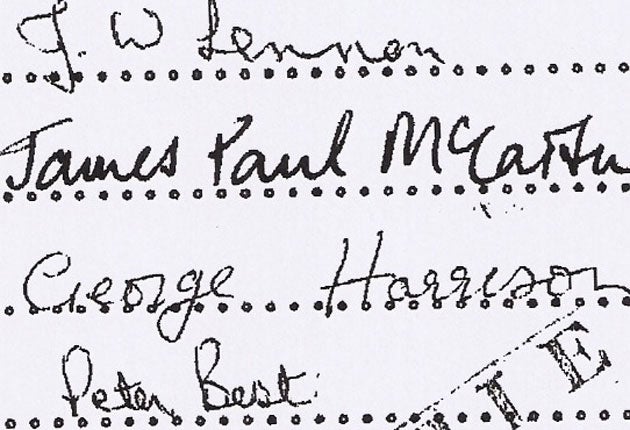The Beatles' first contract expected to fetch £50,000
Written in German, and signed in Hamburg in 1961, long-lost document is 'gold dust'

Your support helps us to tell the story
From reproductive rights to climate change to Big Tech, The Independent is on the ground when the story is developing. Whether it's investigating the financials of Elon Musk's pro-Trump PAC or producing our latest documentary, 'The A Word', which shines a light on the American women fighting for reproductive rights, we know how important it is to parse out the facts from the messaging.
At such a critical moment in US history, we need reporters on the ground. Your donation allows us to keep sending journalists to speak to both sides of the story.
The Independent is trusted by Americans across the entire political spectrum. And unlike many other quality news outlets, we choose not to lock Americans out of our reporting and analysis with paywalls. We believe quality journalism should be available to everyone, paid for by those who can afford it.
Your support makes all the difference.The first recording and publishing contract signed by the Beatles is to be auctioned in London this week. The seven-page document, whose existence was previously unknown and details of which are published here for the first time, turned up in Switzerland earlier this month.
The contract, which is expected to fetch at least £50,000, is unique as it is the group's first, and was believed to have been lost until its owners recently decided to part with it.
The signing by the young band in Hamburg, Germany, on 19 June 1961, was risky as none of group knew what they were getting into: the contract was written in German, with no translation made available. But so keen were the band to have a recording contract, they signed anyway.
There are five signatures: John W Lennon, James Paul McCartney, George Harrison (then only 18) and the group's former drummer, Peter Best. He was sacked a year later to make way for Ringo Starr. The fifth signature belongs to the German band-leader Bert Kaempfert. At the time, he was also an arranger and producer and hired the Beatles under the auspices of Polydor Records to back the English singer Tony Sheridan.
It is believed that the contract was passed from Kaempfert to a friend, another German producer, who gave it to his daughter. She has held on to the papers at her home in Switzerland until now.
Mark Lewisohn, a Beatles historian and widely regarded as the world's leading authority on the band, said this weekend: "It's a unique document. The recordings we've had for 50 years, but the contract that allowed those recordings to be made has never been seen, and it's the only Beatles recording contract that's ever come up for auction.
"They only found out six or seven months later what it was they had signed. Fortunately, Kaempfert was a fair man."
Originally, as they began their career in Hamburg, the Beatles were far more popular in the German port city than they were in the UK – where they were virtual unknowns at the time.
The agreement covered three major hits for the band: "My Bonnie", "Ain't She Sweet" and "Cry for a Shadow", as well as backing Sheridan on another five numbers, released before their return to the UK.
Enjoy unlimited access to 100 million ad-free songs and podcasts with Amazon Music
Sign up now for a 4 month free trial (3 months for non-Prime members)
Enjoy unlimited access to 100 million ad-free songs and podcasts with Amazon Music
Sign up now for a 4 month free trial (3 months for non-Prime members)
The document states that the band would receive royalties of 2 per cent from sales and 25 German marks (roughly £8) each per day, including the cost of a first-class rail ticket.
It also states that Lennon would receive the payments on behalf of the band, as he was then the "representative" of the group.
The names and addresses of each of the four members are printed on the front of the document, though some spellings appear to have become lost in translation. John Lennon's address is given as "251 Manlove Ave", when it was in fact "251 Menlove Ave", and Paul's surname is spelt "McCartuey." These minor errors are unlikely to have an adverse effect on the price the contract realises at auction.
It also reveals what little creative control they had with their music during their formative years. It states: "The songs are to be chosen by mutual agreement. If no agreement can be reached, the decision is to be made by the production team."
The stipulation is in stark contrast to five years later when they would start to experiment at their leisure on albums such as Revolver and Sgt Pepper's Lonely Hearts Club Band.
Ted Owen, of the auctioneers Fame Bureau, who located the contract, said yesterday: "The most important thing about this contract is that we didn't know it existed. It's gold dust."
The auction takes place on Thursday, at the Theatre Royal in central London
Join our commenting forum
Join thought-provoking conversations, follow other Independent readers and see their replies
Comments